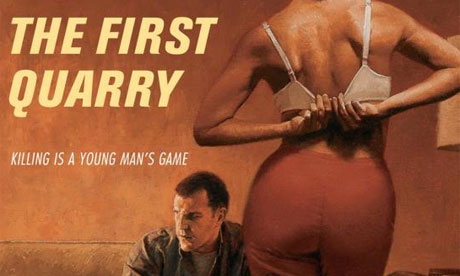
Just take look at these beauties! They're from a publisher called Hard Case Crime and I'd rather put them on my wall than face them inwards on my shelves. After I've read them, that is. Among the many virtues of those covers is that they work so well as promises. Who wouldn't want to read Lemons Never Lie, with an image like this one and a recommendation as forthright as Elmore Leonard's: "Whatever Stark writes, I read"?
I've only just heard of Hard Case Crime (after being alerted to them by Max Cairnduff, a regular commenter on this blog) but it's the kind of publisher I've long been looking out for. Houses with strong visual identities are special, partly because of the simple pleasure of a well-crafted cover, but also because they might well point the way to the future.
One of the most persuasive theories I've heard about the survival of publishers in the digital era is that those that will flourish will be the ones with the most distinctive brands. To tempt people to return repeatedly to an iPhone or iPad application, splash out on a range of ebooks or best of all treat themselves to a printed book, publishers are going to have to create a sense of worth beyond simple words. Otherwise, they'll simply be lost among all the other megabytes of digital slurry.
If this theory is right, most of today's publishing houses should be worried. Brand creation is not something they do well any more. The music industry has rightly taken a lot of stick in the past decade, but at least labels like Def Jam, 4AD, Rough Trade and Naxos have instantly recognisable identities. If predictions about the death of the web search engine and the primacy of the branded application come true then quite a few music labels should be in a strong position, as long as they can bring the right technology. But publishers? Are enough of them truly distinctive? How many people can even recognise individual publishers' logos, let alone a coherent visual identity to their products? Probably quite a few among the readers of this blog – but I'd be very curious to know how many people beyond this and similarly rarefied circles can recognise anything other than the waddling Penguin.
So when someone like Hard Case Crime comes along, it's a cause for celebration. This publisher seems to be doing everything right. It has those gorgeous covers. It has a smart logo ("smart" in the sense that it looks good and also in that it explains exactly what the brand is about). It has a really strong sense of direction and quality, backed up by a good roster of authors. Established greats (like Stephen King, Donald E Westlake, George Axelrod) sit alongside intriguing unknowns (like Jack Clark, a Chicago cabby who sold his first 500 books to passengers in his car) and the books are all dressed in the same knowing, arch, beautiful clothing. They almost give off an aura.
If anyone is well placed for survival, well ... that's where my theory almost breaks down. As soon as I saw those covers, I emailed Hard Case Crime. The reply arrived within hours and rather took me by surprise. Editor Charles Ardai wrote:
"As it happens, we've been in a transition period since our long-time publisher, Dorchester Publishing, abruptly announced in August that, after nearly 40 years, they were exiting the paperback book publishing business to concentrate instead on ebooks. The result was that two titles we had queued up to come out never did and we've had to scramble to find a new publisher.
"But as it happens, later today we'll be announcing that we did find one – and it's one based in London! So there's a 'phoenix-like death and rebirth of Hard Case Crime' story to be told that might actually be a perfect fit for your blog."
The phoenix story is indeed a good fit. Although it does rather torpedo my story about the survival of the fittest-looking. I couldn't tell you the first thing about the brand identity of Titan Books, the company that has become Hard Case Crime's new publisher. OK, perhaps I could flounder around and say the fact that they have bought them shows how much the look and feel of Hard Case is worth. But the reality is that, in publishing, success still has as much to do with luck as looks.
So as not to end on such an ambivalent note, I can at least say with more certainty that the survival of Hard Case Crime is a good thing, at least if the book I've just read is anything to go by. Charles Ardai sent me a copy of Donald E Westlake's Somebody Owes Me Money and it's every bit as gripping as its cover suggests. As is right with pulp fiction, I munched it up in one day. I finished it in just two train journeys, from Norwich to London and back, and it made even that hellish ride rattle along at an exhilarating pace. It was smart, fast and funny (sample two-liner: "His bluffs were as transparent as wax-paper. A bluff being so unnatural to him, he would start acting weird, like a robot going crazy in a science fiction story.") It was also completely deranged in its plotting – every bit as deranged as its cover. Of course, a taxi doesn't actually drive through the legs of a giant blonde, but otherwise the artwork is among the most descriptive and fitting I've ever seen. And that's definitely a good thing.







